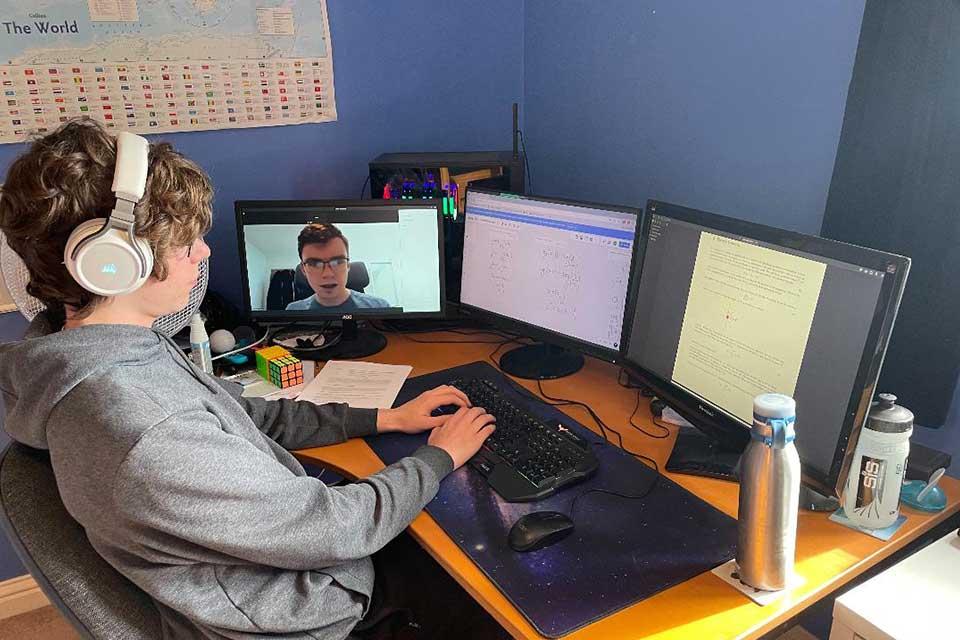Results released by the Department of Physics’ Comprehensive Oxford Mathematics and Physics Online School (COMPOS) show more than 90% of GCSE and A-level students completing the programme improved their ability and performance.
COMPOS is an innovative large-scale long-term outreach project designed to help enthusiastic school students to systematically learn mathematics and physics at a deep level by offering them free tuition and mentoring. The COMPOS curriculum largely follows the school syllabus, but presents the material at a higher and deeper level, concentrating on problem-solving skills. Students receive assignments, to solve throughout the academic year along with links to resources; work is marked by a tutor – typically an undergraduate from the Oxford Department of Physics – who also delivers weekly online tutorials in small groups of five or six students. The assignments and tutorials are complemented by weekly webinars for each year group.
The programme launched with a pilot four years ago and results released today show:
- More than 90% of students completing COMPOS say their ability was improved and went on to gain A or A* grades in A level maths and/or physics
- More than 90% of students report greater confidence in science and around 85% say they are likely to study it at university
- For the COMPOS students who completed A levels in 2023, 100% went on to do a STEM degree, with 96% going to Russell Group universities and 50% to Oxbridge
- The average COMPOS student outperforms at A level by 55% in maths and 48% in physics, while of the top performing COMPOS students (with an average GCSE score of 9) 100% achieved A* in physics while 93% achieved A* in maths
- At GCSE level, 86% of students achieved A* in maths compared to 31% of similarly matched students nationally (matched by GCSE average score) and 69% achieved A* for physics compared to 21% nationally
- 98% of students said they would recommend the programme to a friend and 97% enjoyed the course.
The programme favours students from disadvantaged backgrounds, whose applications are prioritised and all students receive free tuition through COMPOS. The proportion of socially disadvantaged students has doubled to 20% in three years, even though only around 7% of A-level students in physics qualify for free school meals. The programme actively seeks to open science to a wider community of talent, with 30% of students being female.
Professor Alex Lvovsky, who founded and leads COMPOS from Oxford University Physics said: ‘After three years, the number of young people transforming their capability in science through this programme has grown five-fold, and we now have far higher demand than we can satisfy. Our data clearly shows that, while students begin this programme at a lower level than the top A-level students in physics, by the end of it they exceed the top performers.’
Professor Ian Shipsey, Head of Oxford University Physics and a world-renowned particle physicist said: ‘Programmes like COMPOS are vital in nurturing scientific talent regardless of background, and the success of the programme shows that our approach really works. As someone who grew up in a working-class family in East London, attended a comprehensive school without a trained A-level physics teacher, and was the first in my family to attend university, I understand first-hand that programmes like this provide the support and encouragement that can transform a passing interest in science into a lifelong passion and career.
‘If the UK wants to maintain its position as a global leader in scientific innovation, we must invest in diverse talent through programs like COMPOS. We're not just shaping individual careers; we're securing the UK’s future at the forefront of scientific discovery.’
Demand from students outstrips places on the programme based on current funding. This year the programme is on course for around 3,000 applications, a five-fold increase on 2022. This number is roughly 10% of the total number who took physics A level last year.
Professor Lvovsky concludes: ‘We would like to continue to grow COMPOS to meet rising demand from schools and students, because we believe this could help to transform science learning across the UK. To keep tuition free for those without means and pay a modest amount to university students working as tutors, we rely on private donors – which limits our ambition to expand. However, the success of this programme both benefits individual students and helps to building a stronger, more diverse pipeline of future physicists and STEM professionals to keep the UK at the fore of scientific discovery and innovation.’
COMPOS is part of an award-winning programme of engagement activities delivered by the Oxford University Physics Department, encompassing initiatives that support potential applicants to Oxford from underrepresented backgrounds, as well as local projects that engage residents from areas of Oxford, which are among the 20% most deprived wards in the UK.
To find out more about supporting COMPOS, contact Professor Lvovsky.

